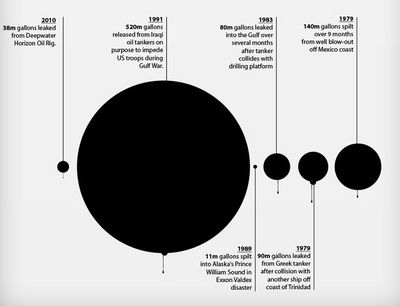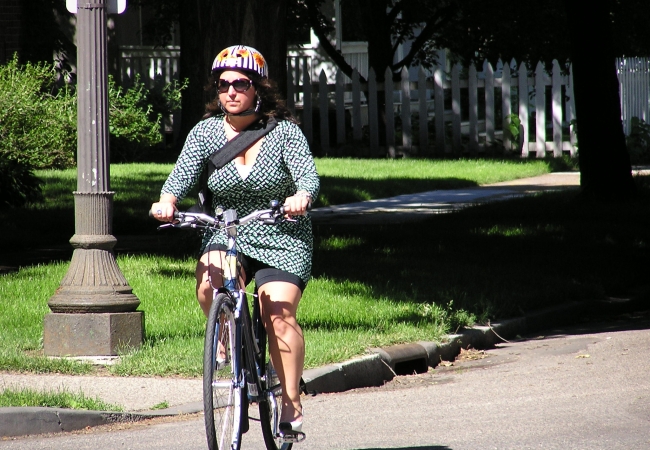What’s wrong with this viral oil-spill graphic, the digital addiction, sweat and the modern woman, the cars of NPR, and scenes from your new state park.
I’m out sick today so posting here will be light today.
1) A cruise line has put together an interesting Web site to document the Gulf oil disaster and in the process put this graphic together to show why it’s not as big a deal as other oil “spills.” You’ll be seeing this in your INBOX soon; Trust me. Click the image for a larger view.
What’s wrong this visual representation? Take your time. When you’re ready, the answer is here.
From the Department of Two Can Play That Game: I wrote yesterday about the brouhaha over BP buying sponsorship positions on Google search. Check out the third item when searching “oil spill” this morning:

You know what can neuter a corporation’s public relations blitz in a hurry? A TV anchor who does his job. Harry Smith today destroyed a BP executive’s attempt to talk his way around a tough question:
“I think you should create a large fabric tube to help control the amount of oil that gets away from the leak. I think something like parachute cloth might work because that fabric is quite a tight weave – water passes through, but I don’t think oil would.”
And here’s the best of today’s oil disaster coverage. An AP reporter goes for a dive in the Gulf.
2) It’s quite an anti-digital screed/editorial in the Star Tribune today.
But now, with our need to process a relentless flow of incoming and outgoing information, our personal relationships have been devalued, our manners coarsened, our creativity dampened, our thinking fragmented, our attention span destroyed. We tend to lose our trains of concentration.
It’s based on this New York Times article, which claims the digital universe is closer to drugs and alcohol as an addiction that a tool to improve productivity.
But is the example of the article — a family in San Francisco — typical? You tell me.
He goes to sleep with a laptop or iPhone on his chest, and when he wakes, he goes online. He and Mrs. Campbell, 39, head to the tidy kitchen in their four-bedroom hillside rental in Orinda, an affluent suburb of San Francisco, where she makes breakfast and watches a TV news feed in the corner of the computer screen while he uses the rest of the monitor to check his e-mail.
Major spats have arisen because Mr. Campbell escapes into video games during tough emotional stretches. On family vacations, he has trouble putting down his devices. When he rides the subway to San Francisco, he knows he will be offline 221 seconds as the train goes through a tunnel.
Is this related? A Michigan study says students today are less empathetic than students from the ’90s. They are unable — or unwilling — to put themselves in other people’s positions and less empathetic to those who are not so fortunate. The lead researcher suggests that this is the fallout from social networking; people don’t have enough face-to-face contact.
Take it with a grain of salt, the Michigan State newspaper says:
Facebook, Twitter and the like put the poster out there for the world to see. It takes only a cursory glance at a blog or website to see someone’s interests, his or her favorite movies and/or relationship status. Sites like eHarmony revolve around the idea of putting out information and letting people come to the poster. Perhaps our lack of empathy is based less on our narcissism and more on the fact that we have a great deal of information already available to us. We don’t have to ask probing questions or feel each other out, we already know. There is no point in fishing around or paying attention to how someone feels if they’ve already done it in 140 characters or less.
3) But maybe we’re not the societal dolts the Strib thinks we are. There are more and more people like Rachel Bents of St. Paul, profiled today by MPR’s Dan Olson. She’s given up her car and gone all bicycle.
Bents says her recent decision to get rid of her car and rely more on her bike for commuting raises the perennial perspiration question.
“How do I go to work, how am I presentable at a meeting? How do I go on a date even?” she said. “How do I do some of those things where traditionally it’s not appropriate to be all sweaty?”
Isn’t there an app for that?
Here’s the natural intersection of the simple world of the bicycle and the addiction of digital:
4) NPR listeners aren’t cut from the Volvo/BMW-driving stereotype. Apparently they don’t drive Subarus, either. (h/t:Julia Schrenkler)
5) The state closed its purchase of U.S. Steel land to create a new state park on Lake Vermilion. Here’s a few looks at your new campground lake. Good deal or bad?
WHAT WE’RE DOING
Midmorning (9-11 a.m.) – First hour: Through genetic screening, the Trebing family was able to conceive a child who was a genetic match for a daughter with a terminal illness. A risky, but ultimately successful, bone marrow transplant followed. Their story raises the ethical dilemma of creating one life to save another.
Second hour: Journalist Sebastian Junger is fascinated by people living and working in extreme situations. His new book chronicles his experience embedding with the men of a U.S. Army platoon in one of the most dangerous regions of Afghanistan.
Midday (11 a.m. – 1 p.m.) – First hour: TBA
Second hour: TBA
Talk of the Nation (1-3 p.m.) – First hour: Election results and analysis with NPR political editor Ken Rudin.
Second hour: An NPR investigation reveals that the military’s medical system is failing to diagnose brain injuries in troops who served in Iraq and Afghanistan. NPR’s Daniel Zwerdling looked into the military’s system of caring for soldiers, who suffer from traumatic brain injury. He joins Neal Conan, along with Gen. Peter Chiarelli, the Army’s second in command.
All Things Considered (3-6:30 p.m.) – The three DFL candidates for governor agree on the need to raise taxes, but they’ve been butting heads over the scope and amount of those increases. Mark Dayton says new tax revenue could solve about $5 billion of a projected $6 billion state budget deficit. But his DFL primary opponents strongly disagree. MPR’s Tim Pugmire examines an issue in the gubernatorial campaign.


